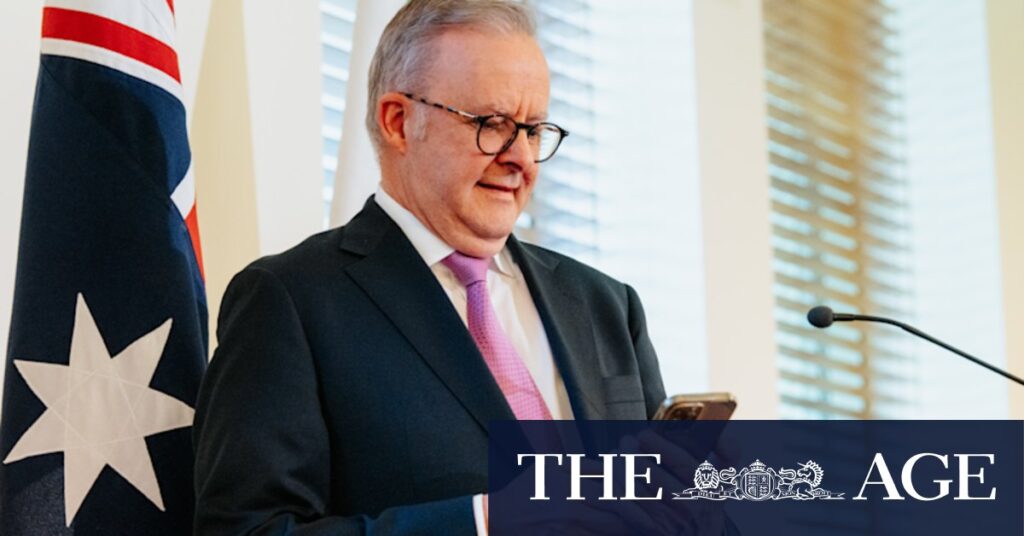
The phone numbers of several high-profile Australian politicians, including Prime Minister Anthony Albanese and Opposition Leader Sussan Ley, have been publicly exposed on an American website that leverages artificial intelligence to scrape and compile contact profiles. This revelation has sparked significant concern within the Australian government, prompting security services to launch an investigation. Several Members of Parliament are actively seeking to have their personal details, such as phone numbers and emails, removed from the site.
Acting Prime Minister Richard Marles addressed the issue at Parliament House on Tuesday morning, stating, “We’re obviously aware of this. We’ve notified authorities, and that is being worked through, but obviously, there is concern.” The Australian Federal Police has been contacted for further comment.
Politicians and Public Figures Affected
Alongside Prime Minister Albanese and Opposition Leader Ley, the website lists contact numbers for other notable figures, including former Prime Minister Scott Morrison, former Foreign Affairs Minister Julie Bishop, and even business numbers for international leaders such as former US President Donald Trump.
A spokesperson for Sussan Ley commented, “We were made aware of this issue when media contacted us yesterday. This is obviously concerning, and we have reached out to LinkedIn to understand what occurred here. We are waiting for their response. We have asked the website to remove the information.”
Website’s Response and LinkedIn’s Involvement
The US-based website offers an opt-out form for users wishing to remove their profiles, promising to take down contact details within a week of a request. However, some numbers listed appear to be inaccurate when verified by this publication.
LinkedIn has been suggested as a potential source for the scraped phone numbers. However, a LinkedIn spokesperson stated, “Our policies are clear that third-party companies taking personal data and using it in ways our members did not agree to is prohibited, and these companies are not affiliated with LinkedIn.”
“Our policies are clear that third-party companies taking personal data and using it in ways our members did not agree to is prohibited, and these companies are not affiliated with LinkedIn,” a LinkedIn spokesperson said.
Privacy Concerns and Expert Opinions
Tom Sulston, head of policy at Digital Rights Watch, expressed that while the publication of politicians’ contact details might be a nuisance, it poses a significant threat to individuals desiring privacy. “In terms of Anthony Albanese, the worst thing that’s probably going to happen to him with his phone being leaked is he’ll get a few prank calls, and then he’ll have to get a new phone number,” Sulston noted. “But if you’re someone who’s getting out of domestic violence, your address is leaked, that could be literally fatal.”
Despite the unclear source of the data, Australia has experienced several high-profile data breaches in recent years, involving companies such as Optus, Medibank, and Qantas. Just last week, the personal data of 5.7 million Qantas customers was published on the dark web.
“Could the data have come from one or some of those? Yeah. Could this company have gone on to the dark web and gone and bought data sets of 5 million Australians? They could have done that. Could we prove it? It would be very difficult,” Sulston said.
Historical Context and Future Implications
This incident is not unprecedented. In 2017, the Department of Parliamentary Services accidentally published the private phone numbers of hundreds of federal politicians, including former prime ministers. The department had intended to release a redacted list of phone bills but inadvertently included phone numbers in a white font that became visible when copied and pasted.
As Australia prepares for the under-16 social media ban starting December 10, which will require age verification through government ID, privacy concerns are likely to escalate. Sulston warns that companies are already collecting and storing more data than necessary, and such regulatory changes may exacerbate privacy issues.
As the government and affected individuals navigate the repercussions of this data exposure, the broader implications for privacy and data security in Australia remain a pressing concern. The situation underscores the need for robust data protection measures and a reevaluation of how personal information is handled in the digital age.







